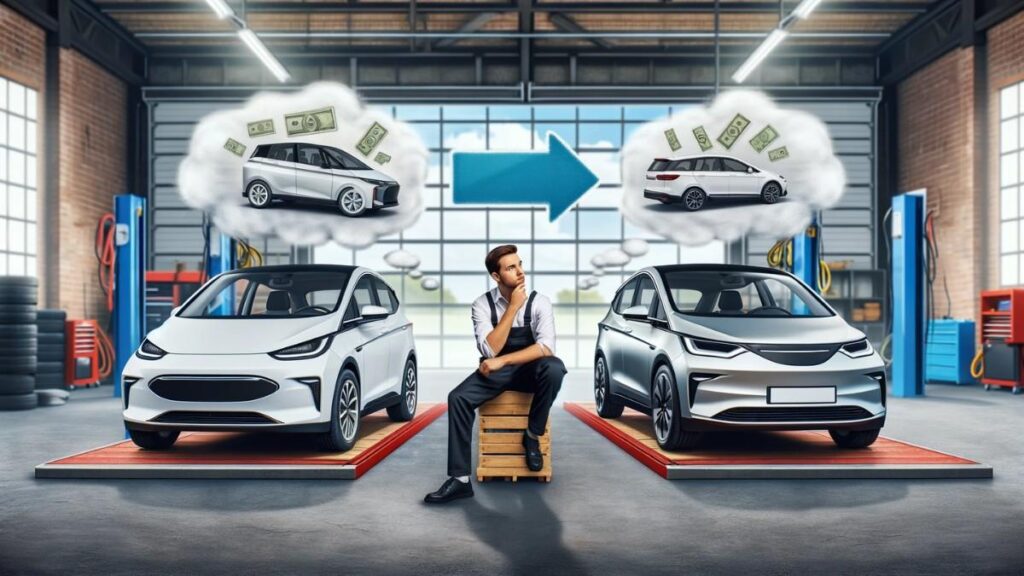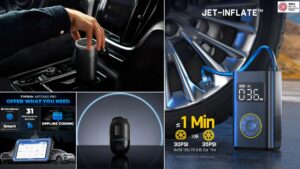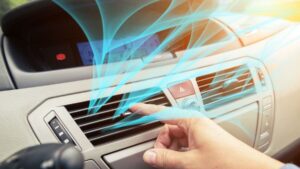Buy a new EV or convert your old car to electric? This comprehensive guide, including pros and cons, lets you decide

Electric Vehicles (EVs) have seen a dramatic rise in popularity in recent years, with global sales of electric transport doubling in 2021 compared to 2020, reaching 6.9 million units. This is a substantial increase from the mere 120,000 electric cars sold worldwide in 2012. The market’s growth trajectory is expected to continue, with predictions that the value of power for EV charging will increase more than 20 times by 2030, making up a significant portion of the current diesel and gasoline market value.
In this context, converting existing petrol or diesel cars to EVs emerges as a sustainable and potentially more affordable alternative to purchasing new electric cars. A decade ago, converting a fuel-driven car to an electric one was a challenging and costly endeavor. However, recent advancements and regulatory changes have made this option more accessible. Authorities have revised regulations, such as the Central Motor Vehicles Rules, 1989, to allow vehicles to be retrofitted with an electric core, thereby enabling the transformation of old cars into more environmentally friendly EVs.
Despite the environmental benefits, concerns regarding the cost of conversion persist. Converting a petrol or diesel car to an electric vehicle can be expensive, with the cost of conversion kits and related services potentially reaching around five lakhs. However, this investment is often justified by the long-term savings in fuel costs and lower maintenance requirements of electric vehicles, as well as the positive environmental impact.
List of Topics Covered in this Article
- The process of conversion
- Levels of conversion
- The cost of conversion
- Comparison between the cost of conversion and new EV
- Pros and Cons of Conversion of old cars to EVs
- RTO Approvals and Legal Formalities
- List of companies offering Conversion from Old Car to EV
- FAQs of Converting Old cars to EVs
- Additional Considerations
- Government Websites and Resources
- Conclusion
The Process of Converting a petrol or diesel car into an electric vehicle (EV)
Converting a petrol or diesel car into an electric vehicle (EV) involves a series of complex and technical modifications to replace the internal combustion engine and its associated systems with electric components. Here’s a breakdown of the key steps and components involved in this process:
- Replacing the Internal Combustion Engine (ICE) with an Electric Motor: The heart of the conversion is the replacement of the vehicle’s petrol or diesel engine with an electric motor. This motor is responsible for propelling the vehicle, and its selection depends on the vehicle’s weight and wheel dimensions, which affect the choice of parts like brakes or the suspension system.
- Installing a Battery Pack: A battery pack is the primary source of power for the EV. Commonly used batteries include lead-acid flooded type batteries, AGM (Absorption Glass Mat) sealed maintenance-free batteries, Ni-MH, and Li-ion batteries. Li-ion batteries are particularly notable for their light weight, long life, and maintenance-free nature, though they are more expensive. The battery must be installed in a way that doesn’t compromise the vehicle’s volume distribution, dynamic behavior, or safety.
- Modifying the Transmission and Drivetrain: The gearbox, crucial to a vehicle with an internal combustion engine, may become redundant in an EV. Retaining the gearbox can detract from the advantages of an electric motor, but removing it requires significant alterations to the vehicle.
- Updating the Existing Electrical System: This includes installing a charging circuit for the EV. The wattage of this circuit is often limited by heat dissipation concerns, which can be challenging if the vehicle wasn’t originally designed to accommodate it.
The conversion process varies depending on the vehicle’s make and model, and not all vehicles are suitable for electric conversion. Additionally, the conversion process is rarely generic; specific kits are developed for mainstream models to simplify supply, integration, and homologation.
Levels of Conversion
There are different levels of conversion available, ranging from basic functionality-focused conversions to more advanced ones with additional features and performance enhancements. The extent and sophistication of the conversion will depend on factors like the vehicle’s eligibility for retrofitting, the owner’s budget, and the desired range and performance of the converted EV.
For instance, a basic conversion might focus solely on replacing the engine with an electric motor and installing a standard battery pack. In contrast, a more advanced conversion might include high-performance motors, advanced battery systems for longer range, and upgrades to the vehicle’s braking and suspension systems to handle the new dynamics introduced by the electric powertrain.
The Cost of Conversion in India
Converting a petrol or diesel car to an electric vehicle (EV) in India involves several cost components:
- Conversion Kit: The price of conversion kits varies based on the manufacturer, features, compatibility, and performance. DIY kits range from ₹2,00,000 to ₹5,00,000, while professionally fitted kits can cost between ₹4,00,000 and ₹10,00,000.
- Additional Materials and Components: This includes wiring, connectors, cooling systems, adapters, and mounting brackets. The costs can vary depending on the vehicle’s specifications and the conversion kit used.
- Labor Costs: If opting for professional assistance, charges can range from ₹1,00,000 to ₹3,00,000. Electricians and mechanics may charge hourly rates from ₹500 to ₹2,000.
- Battery and Charger Costs: Battery costs, crucial for determining range, can vary from ₹2,00,000 to ₹8,00,000, depending on capacity and quality. Charging systems can cost between ₹20,000 and ₹1,00,000.
- Overall Conversion Expense: Conversion prices in India range from ₹4 lakh to ₹6 lakh. This includes the cost of the EV powertrain and necessary modifications for diesel to electric conversion, which is more involved than converting a petrol car to CNG.
Comparing Conversion Cost to New EV Prices
- Budget EVs: The Tata Tiago EV, one of the more affordable new EVs, ranges from ₹8.69 – ₹12.04 Lakh, and the MG Comet EV costs between ₹7.98 – ₹9.98 Lakh.
- Mid-Range EVs: The Tata Nexon EV is priced between ₹14.74 – ₹19.94 Lakh, and the BYD E6 is available for around ₹29.15 Lakh.
- Premium EVs: Higher-end models like the BMW i7 range from ₹2.03 – ₹2.50 Cr.
Considering these price points, converting an existing vehicle to electric can be a more affordable option than purchasing a new EV, especially when comparing to mid-range and premium EVs. However, the cost-effectiveness depends on the make and model of the vehicle being converted, the specifications of the conversion kit, and the desired range and features.
Should You Go for Conversion?
The decision to convert a petrol or diesel car to an EV in India depends on several factors:
- Budget: If the cost of conversion aligns with your budget and is less than buying a new EV, it could be a viable option.
- Vehicle Suitability: Not all vehicles are eligible for conversion, so this needs to be ascertained first.
- Usage and Range Requirements: If the converted EV meets your daily commute and range requirements, conversion can be beneficial.
- Environmental Consideration: Converting to an EV contributes to reducing carbon emissions, aligning with environmental sustainability goals.
Pros and Cons of Converting Your Car to Electric in India
Pros:
- Reduced Emissions and Environmental Impact: Converting a petrol or diesel car to an electric vehicle significantly reduces greenhouse gas emissions, contributing to a cleaner environment.
- Lower Running Costs: Electric vehicles typically have lower running costs compared to traditional internal combustion engine vehicles, as electricity is cheaper than petrol or diesel.
- Government Incentives and Subsidies: The Indian government has introduced several incentives to promote electric vehicles. The FAME India initiative, launched in 2015, focuses on demand for technology, pilot projects, technology development, and infrastructure for charging. In 2021, the Department of Heavy Industry introduced the Production Linked Incentive for Advanced Chemistry Cell Battery Storage (PLI-ACC Scheme) to support domestic and international investment in ACC manufacturing facilities in India.
- Extending the Life of Your Existing Car: Converting to an electric vehicle can extend the life of your current vehicle, making it more sustainable and cost-effective over time.
Cons:
- High Upfront Cost: The conversion process can be expensive due to the cost of the conversion kit, additional materials, and labor.
- Limited Range Compared to New EVs: Converted electric vehicles may have limited range, especially if the battery capacity is not on par with that of new EVs. Most electric vehicles in India are fixed for a specific range, typically around 100KM.
- Potential Performance Compromises: Converted vehicles might not offer the same level of performance as factory-built electric vehicles, particularly in terms of speed, acceleration, and efficiency.
- Availability of Qualified Conversion Specialists: Finding skilled specialists for electric vehicle conversion can be challenging, especially outside major cities.
- Modifications Might Affect Resale Value: Modifications made during the conversion process may affect the vehicle’s resale value, as some buyers may prefer factory-built EVs over converted ones.
RTO Approval and Formalities
To get a converted electric vehicle approved by the Regional Transport Office (RTO) in India, you need to follow certain legal procedures:
- Obtaining a No Objection Certificate (NOC): This certificate is required to ensure that the vehicle conversion adheres to legal standards.
- Inspection of the Converted Vehicle: The vehicle must undergo an inspection to confirm that the conversion complies with safety, performance, and environmental regulations.
- Updating the Registration Certificate with the New Specifications: After successful conversion and inspection, the vehicle’s registration certificate needs to be updated with the new electric vehicle specifications.
It is crucial to use certified conversion kits and specialists for the conversion process. The Type Approval procedure involves two steps: Kit component level approval and vehicle level approval. All the component aggregates added to the vehicle, including the traction motor, battery, inverter, and wiring harness, need to be approved first. After this, the retrofitted electric vehicle must be submitted to ARAI (Automotive Research Association of India) for Type approval. The approval process includes tests for vehicle weight changes, brake performance, motor power, and safety compliance of traction batteries.
Companies Offering Petrol/Diesel to EV Conversion Services in India
Here’s a table summarizing the companies offering petrol/diesel to EV conversion services in India:
| Company Name | Website | Location | Category |
|---|---|---|---|
| E-trio | www.etrio.in | Hyderabad | E4W (Electric Four-Wheeler) |
| Loop moto | www.loopmoto.com | Gurugram | E2W & E4W |
| EV retron energies | www.retronev.in | Hyderabad | E2W & E4W |
| Cell propulsion | www.cellpropulsion.com | Bengaluru | E4W |
| RACEnergy | www.racenergy.in | Hyderabad | E3W (Electric Three-Wheeler) |
| Folks Motor | www.folksmotor.com | New Delhi | E4W |
| Volta Automotive | www.voltaev.in | Bengaluru | E3W |
| Northway Motorsport | www.northwayms.com | Pune | E4W |
| Motor Kit | www.motorkit.in | Ahmedabad | E2W & E3W |
| Bosch | www.Boschmobility.com | – | E4W |
| GoGoA1 | www.gogoa1.com | Navi Mumbai | E2W, E3W & E4W |
| Zuink | www.zuink.in | Bangalore | E2W |
| EVZoN | www.evzon.in | Ahmedabad | E2W, E3W |
This table provides a concise overview of various companies across India that specialize in converting petrol and diesel vehicles to electric vehicles, along with their locations and the categories of vehicles they handle.
It is advisable for readers to research and compare different companies based on their experience, expertise, warranty options, and customer reviews to find the best fit for their needs. Each company offers unique services and has different areas of specialization, so it’s important to choose one that aligns with your specific requirements for converting your petrol or diesel car to an electric vehicle.
FAQs: Converting Your Petrol or Diesel Car to an EV
Q: What happens to the old engine and other parts removed during the conversion?
A: The removed engine and other parts can be sold to scrap yards or recycled depending on their condition and reusability. Some conversion companies may offer buyback programs for the old components.
Q: How long does the conversion process take?
A: The conversion time can vary depending on the chosen kit, the complexity of the vehicle, and the conversion company’s workload. However, it typically takes between 2-4 weeks for a basic conversion.
Q: Can I convert any car to an EV?
A: While technically most cars can undergo conversion, the feasibility and cost-effectiveness vary greatly depending on the make, model, and age of the vehicle. Older cars with simpler designs might be easier and cheaper to convert than newer models with complex electronics and drivetrains.
Q: What are the maintenance requirements of a converted EV?
A: Converted EVs require regular maintenance similar to conventional vehicles, including checking brakes, tires, and suspension. Additionally, the battery pack needs periodic checks and potential replacements over time. However, the absence of a traditional engine eliminates the need for oil changes and other combustion-related maintenance.
Q: How will the conversion affect my insurance?
A: You will need to inform your insurance company about the conversion and update your policy to include the modifications. The insurance cost might increase slightly due to the higher value of the converted EV. It’s crucial to compare quotes from different insurance providers to find the best coverage at an affordable price.
Q: Can I get government incentives for converting my car to an EV?
A: The government of India offers various incentives under the FAME-II scheme to promote the adoption of EVs, including subsidies for purchasing and converting vehicles to electric. The specific amount of subsidy depends on the type of vehicle and the chosen conversion kit. Visit the official FAME-II website for more information on eligibility and application procedures.
Additional Considerations
Looking towards the future, several promising trends and advancements in EV conversion technology hold the potential to make it more affordable and accessible to a wider audience:
- Standardization of conversion kits: The development of standardized kits for specific car models would streamline the conversion process, reduce costs, and ensure compatibility.
- Mass production of components: As the demand for EV conversions grows, economies of scale will drive down the cost of essential components like electric motors and batteries.
- Advancements in battery technology: Improvements in battery density and energy efficiency will lead to longer ranges and potentially lower battery costs.
- Government incentives and policies: Continued support from governments through subsidies and regulations promoting EV adoption can further incentivize conversion.
- DIY conversion kits and resources: The rise of DIY communities and resources could provide more affordable conversion options for tech-savvy individuals. By embracing these advancements and promoting a supportive environment, EV conversions can become a viable and accessible path for individuals and communities to transition towards a sustainable transportation future.
Environmental Benefits
Choosing to convert your petrol or diesel car to an EV goes beyond personal benefits and contributes significantly to a cleaner and healthier planet. Here’s how:
- Reduced carbon footprint: EVs produce zero tailpipe emissions, significantly reducing your contribution to greenhouse gas emissions and mitigating climate change.
- Improved air quality: By eliminating harmful pollutants released by conventional vehicles, EV conversions contribute to cleaner air and improved public health.
- Reduced dependence on fossil fuels: Transitioning to electric vehicles helps lessen reliance on finite fossil fuels, promoting energy security and exploring renewable energy sources.
- Noise pollution reduction: EVs operate silently compared to their gasoline counterparts, contributing to quieter communities and improved soundscapes.
By making the switch to an electric vehicle, you become an active participant in building a more sustainable and environmentally conscious future for yourself and generations to come.
Government Websites and Resources
For further information and assistance related to EV conversions in India, you can refer to the following government websites and resources:
- FAME-II Scheme: https://fame2.heavyindustries.gov.in/
- Ministry of Road Transport and Highways (MoRTH): https://morth.nic.in/
- National Electric Mobility Mission Plan (NEMMP): https://pib.gov.in/PressReleasePage.aspx?PRID=1795444
- Regional Transport Office (RTO) websites: Each state in India has its own RTO website offering information and regulations related to vehicle conversions.
These resources provide valuable insights, updates on government policies and incentives, and guidance on the legal procedures involved in converting your car.
Conclusion
Converting your petrol or diesel car to an electric vehicle presents an exciting opportunity to embrace a sustainable and environmentally responsible future. While considerations like cost, feasibility, and available resources are crucial, the potential benefits, including reduced emissions, lower running costs, and extended car life, make it a compelling choice for many.
By carefully considering the information presented in this article, conducting thorough research, and choosing a reliable conversion specialist, you can make an informed decision and contribute to a cleaner and greener future for yourself and your community. Remember, the journey towards a sustainable transportation future starts with each individual step, and converting your car to an EV can be a powerful stride in that direction.
Disclaimer: This article has been written after extensive research and interviews with experts. However, it is to be used only for information and readers are advised to check and verify all the pieces of information independently before arriving at any decision. The author of the article or PuneNow cannot be in any way held responsible for any damages arising out of any decision taken by the readers based on this article.









